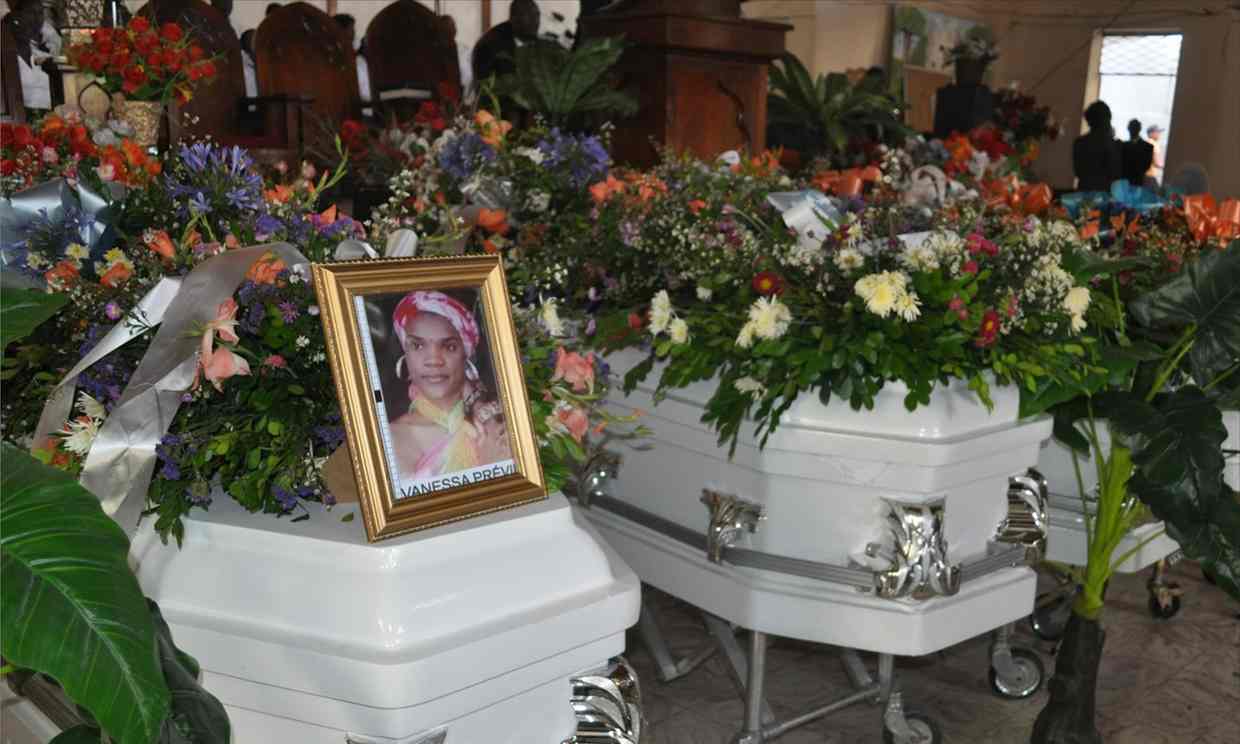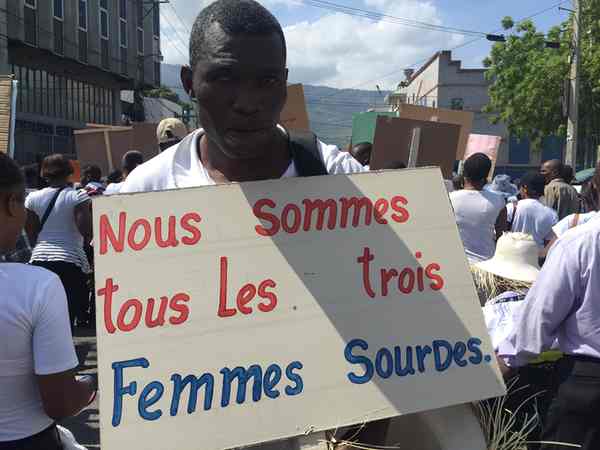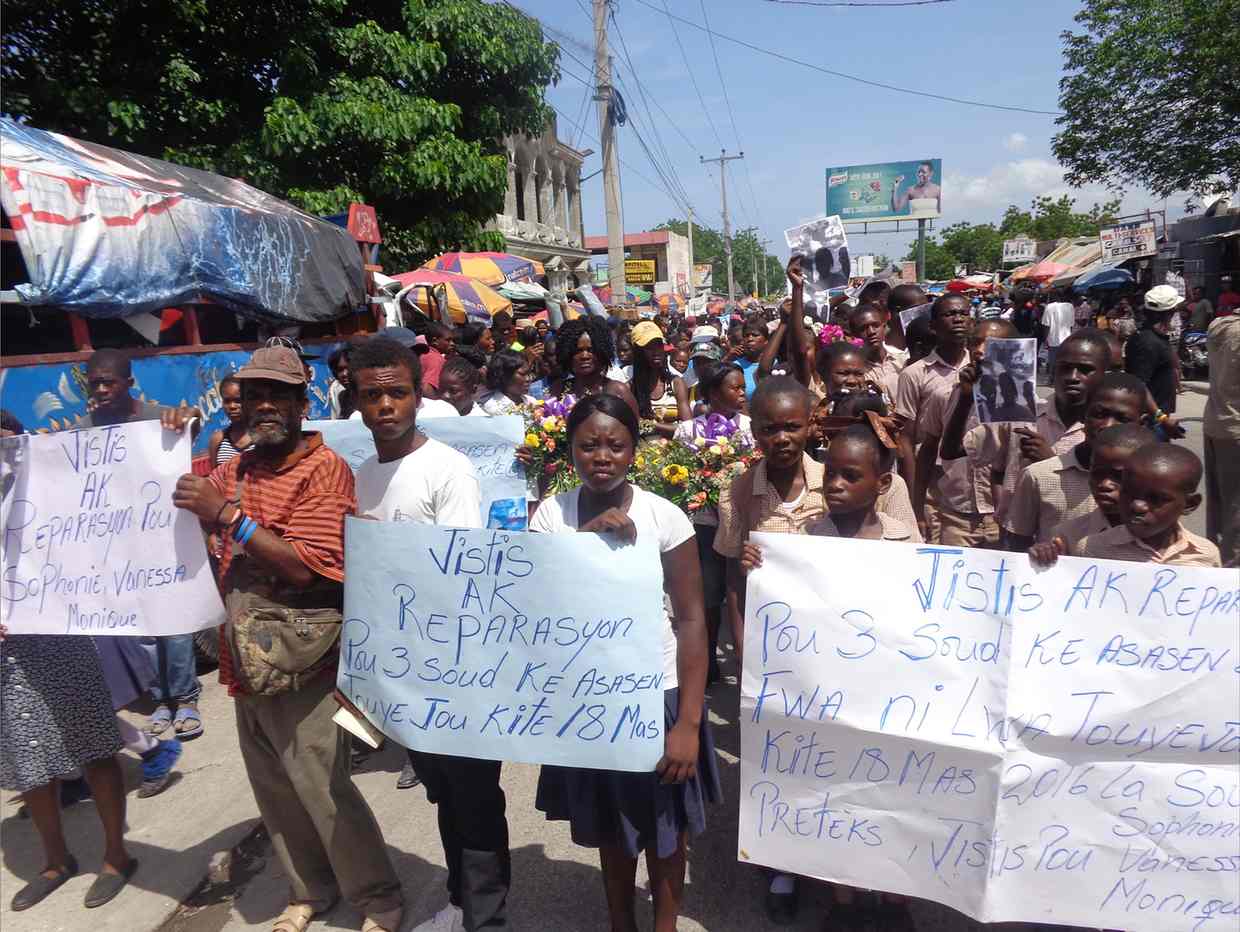Murder of three deaf women in Haiti must be a starting point for change
By Anna Leach,
translation
Carole Villiers.,
July 19,
2016.
 |
| The funeral of Jesula, Vanessa and Monique. Photo: Wesley Gedeon |
The violent killings
have brought the country’s disability rights, women’s rights and
human rights campaigners together to demand action.
On Saturday 11 June
government ministers and campaigners attended the funeral of three
female street vendors, laid to rest in sturdy white coffins laden
with flowers, with more than 2,000 people in attendance. Their brutal
murders had shocked a country.
Jesula Gelin, a mother of
six, Vanessa Previl and Monique Vincent were all deaf and worked in
Haiti’s capital. That is itself was notable – they were
economically independent and lived away from their families in a deaf
community in Leveque, a village about an hour from the city.
On 18 March they had
spent the morning in Port-au-Prince buying business supplies and
visiting their families. They set off home in the early afternoon,
leaving plenty of time to get back before dark on a normal day.
However, a bridge had collapsed on Route Nine, one of the main
thoroughfares, bringing traffic to a standstill.
“It was on the
radio, TV, so everybody knew to avoid those areas,” says Nicole
Phillips, a lawyer who is representing the women’s families. “But
if you’re deaf, you’re not going to benefit from any of that.
They had no idea that the bridge had collapsed.”
The women had been
travelling on a tap tap – the privately run Jeeps that are the
equivalent of buses in Haiti.
But at some point, in the heavily congested traffic, they got off the
tap tap to continue their journey on foot. “They got exhausted,”
says Phillips. “And then late at night, we don’t know what time,
they stopped off in one of the victim’s relative’s house.
The house was owned by a
distant relative. “She had been there before, by car it’s just 20
minutes from where she lives,” says Phillips. “She and the two
other ladies went there to spend the night.”
Reports of what happened
next are from two women who have been arrested in connection with the
triple murder. They lived at the house and say that when the three
deaf women arrived they were frightened and thought that they were
lougawou.
In Haitian mythology, lougawou
or lougarou
are evil spirits who come out at night and cause mischief such as
killing your goats or eating your dog. They are something to be
feared. Disabled people are sometimes labelled bad spirits. “They
think that they are a different creature of god,” says Phillips.
“That helps them justify the stigma of disabled people. You can
tell yourself this [that they are different] and feel more justified
morally.”
 |
| A protest prompted by the murder. Photo: Nicole Philips |
The sequence of events is
not entirely clear, but at some point between 8pm and midnight the
women were tortured and brutally murdered. Phillips has seen
photographs of the bodies with burn marks and machete cuts. The two
women who were in the house and a male accomplice have been arrested
in connection with the murder. But the police have not captured
another main suspect, a distant relative of one of the victims.
“Violence against women
with disabilities is believed to be two or three times higher than
against non-disabled women,” says Lisa Adams, programme director of
the US-based Disability
Rights Fund, which works in Haiti. “Disability, gender and
sexuality compound to present a lot of cultural myths and stereotypes
about women with disabilities – ranging from infantilising them to
making them hyper sexual. I think that has a lot to do with the
violence experienced by women with disabilities in Haiti – these
three women in particular.”
The murders have brought
a furious response from disability rights, women’s rights and human
rights campaigners. “This has brought Haiti’s disability rights
activists together,” says Phillips. “It has galvanised the
community.” On 1 April hundreds of people marched in Port-au-Prince
to demand justice for the three murdered women, and several other
demonstrations around the country followed, including a march on 9
June in Cabaret near where they were killed.
Disabled people in Haiti
are discriminated against in multiple ways. For example, only 5% of
children with disabilities are in school, according to a report by
the Haitian state submitted in the report to the UN Committee on the
Rights of Persons with Disabilities. And people with disabilities
complain that the police don’t take them seriously when they report
crimes and that they are taunted
in public as “cocobe” (useless).
“Haiti is a model for
exclusion,” says Michel Pean, who was secretary of state for the
inclusion of persons with disabilities in Haiti from 2007-11 and is
blind himself. “But it’s also a good example of the fight for
inclusion of people with disabilities within society.” Pean says
that 1 million out of Haiti’s 10 million people have a disability.
Since the earthquake in 2010, there are more people with disabilities
and they have become more visible.
 |
| A march on 9 June Photo: Wesley Gedeon |
But strong civil society
groups have driven successes for disability rights campaigners over
the past 15 years, says Pean. “The idea to have a secretary of
state dedicated to people with disabilities came from civil society.
The same with the idea to have proper legislation came from civil
society. Disability
rights civil society is very active.”
And those activists are
determined to seize this moment of tragedy and force the government
to act. “We want to transform this very negative event into
something positive,” says Pean. “Something which would ensure
that people with disabilities are respected, and their rights are
respected. Their right to education, their right to access to health,
in other words, their right to live, with dignity.”
In response to the
murders, campaigners are calling for the government to include
the rights of women with disabilities into a national gender equality
plan. The government has not replied to that petition yet, but it
did fund the women’s funeral and ministers insist they are doing
all they can to ensure that justice is done.
“For me, as a feminist
activist,” says Nadine Anilus, a member of the Ministry of Women’s
cabinet, “we condemn this criminal act and call the state
authorities to take the necessary steps to make justice and
reparation to the family of three women. Every Haitian citizen must
play their part to improve the situation of people with disabilities.
We are calling for a big national campaign.”
She adds that Haiti needs
to ensure national accidents are communicated in a way that is
accessible for people with disabilities and that more financial
resources are needed for organisations working on these issues.
Pean is clear that it
will take a long time before people with disabilities are treated
equally in the country. “For things to actually change, mentalities
as well, takes a long process,” he says. “One of the things that
has to change is the economic situation in Haiti. Also, it’s
essential that we have political stability. These are necessary
conditions to enable us to reach true inclusion.”
SOURCE: The Guardian


